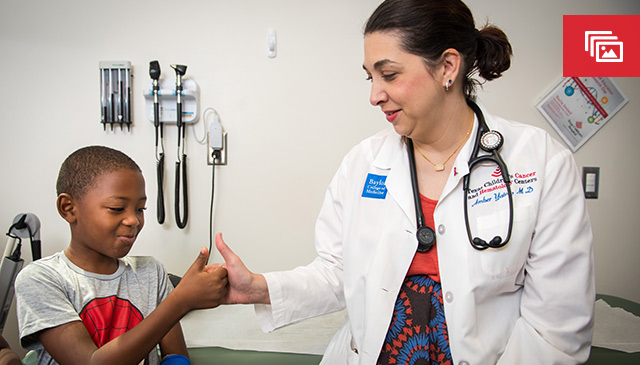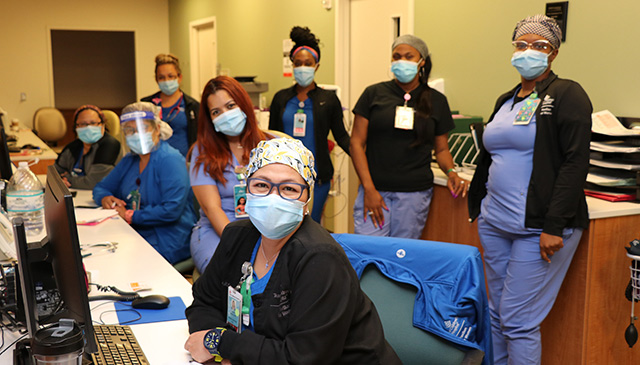
Tara Barrick reflects on the proactive and collaborative steps that our Texas Children’s Pavilion for Women nursing team took to prepare themselves for the COVID-19 pandemic. Read more

Tara Barrick reflects on the proactive and collaborative steps that our Texas Children’s Pavilion for Women nursing team took to prepare themselves for the COVID-19 pandemic. Read more

During the recent Cultural Competency Week celebration, Texas Children’s Health Plan employees had a chance to win prizes in exchange for thoughtful responses to questions posed each day.
Prize winners were:
A sample of the answers are below and may offer us all ideas on how to best promote cultural engagement.
What are some ways that we can promote cultural competence in our everyday life?
When we practice cultural competence in health care, what are some positive results we can experience as a society?
When we practice cultural competency in health care, the individual is seen for who they are (without judgement), heard for what they say (without our interpretation of what they need), cared for with acceptance and understanding of the barriers they may face. Our job is to assess, provide information, give options and let them choose freely the actions they wish to take without coercion. It boils down to respecting the individual we are serving and all that comes with them, all that has shaped them and meeting them where they are. Cultural competence in health care is letting the person we care for be the expert in their life.
Benefits we can expect to see in society:
When was the last time you interacted with someone from another culture in a meaningful way? What did you learn from the experience?
The last time I interacted with someone of another culture in a meaningful (memorable) way was during a visit to the Sam’s Club. Even though it was some time ago, it still resonates with me today. My daughters were excited about the samples of pizza the Sam’s Club staff were providing. A Nigerian woman was one such staff member. One of my daughters, who is left-handed, stretched out her left hand to accept the pizza. The Nigerian woman became offended and began to mildly scold my daughter.
She explained that in her culture it is rude to accept food with only one hand outstretched and especially the left hand.
My daughter looked confused as to why she was being scolded. I explained to the woman that my daughter and I were not aware of her cultural etiquette and explained the differences pertaining to American culture. I told her my daughter meant no harm and thanked her for the opportunity to learn a bit about her culture. Inside I was actually offended myself that she would impose her culture in a place where it was not known or expected. However, my nursing background and training regarding cultural awareness afforded me a moment of pause to consider her feelings as well. I explained to my daughter that she didn’t do anything wrong, and how different cultures have different observances that we should respect whenever possible.
All employees of Texas Children’s Health Plan must take the state-mandated cultural competency course. It is available on HealthStream until Wednesday, September 30.

Tara Paulose’s pregnancy with twins was not easy and the pandemic made it even harder with safety precautions preventing her husband from attending her many visits to the Pavilion for Women to see her doctor and get updates on her babies’ progress.
At one point, Paulose said she was put on bedrest except for trips to the hospital and even then she was told to limit the time she spent on her feet. On those trips, her husband would drive her to her appointment, help her out of the car and into a wheelchair, wheel her through the screening process and then, per hospital safety protocols, send her on her way.
Paulose then would wheel herself to the patient screening table where she would not only be checked for COVID-19 symptoms but befriend Sharla Weindorff, a 22-year Texas Children’s employee charged with leading a small, tight-knit team of people responsible for screening and helping patients coming to the Pavilion for Women.
“Sharla graciously wheeled me to many of my appointments and she did so with kindness and a smile,” Paulose said. “That might seem like a small thing but it’s not. It gave me a lot of comfort during a very trying time.”
After Paulose gave birth to her two healthy babies and returned home from a brief stay in the Neonatal Intensive Care Unit, she reached out via email to Weindorff to thank her and send her a picture of her new bundles of joy. The email and picture meant the world to Weindorff, who said she teared up and got goosebumps while reading Paulose’s message.
“It reminded me why I’m here right now,” Weindorff said. “I’m extremely grateful to have an opportunity to be here at the hospital helping whenever, wherever and however I can.”
Other members of the screening team have had similar experiences with patients and many have said that working together to keep people safe has offered them a chance to meet new people, create new friendships, and be useful in uncertain times.
“It makes me feel so good that I can help somebody,” said Mel Cardenas, a member of the screening team. “I believe this is an experience I won’t forget.”
Cardenas, Weindorff and the team of three other screeners and one elevator operator was formed in June when Pavilion leadership decided they wanted the people screening their patients to be Pavilion employees who knew the building well and could easily answer patient’s questions.
Four members of the team – Cardenas, Patti Lambert, Andrea Savannah and Weindorff – all are administrative assistants in the Pavilion. Yajaira Mancia from International Services joined the team via Labor Pool and liked it so much she requested a regular shift with the team, and Samuel Gil is the team’s elevator operator keeping everyone safe by helping to enforce the hospital’s social distancing rules. Since they started working together, the team has screened more than 30,000 patients.
“I am so impressed with this team and what they’ve been able to accomplish together for the good of our patients, families and each other,” said Michele Birsinger, assistant vice president for Women’s Services. “They are doing an incredibly important job with remarkably positive attitudes.”
Lambert said the experience has been eye-opening because it has exposed her to more patients and the issues they are dealing with when they come to the hospital seeking care. She said many of the women she’s encountered are experiencing high risk pregnancies and that telling them their loves ones can’t accompany them to their appointment is hard but the right thing to do under the circumstances.
“Most of them are very kind and understanding,” Lambert said. “But, we understand it’s disappointing and difficult, and try to help make their experience as comforting as possible.”
Savannah said she’s learned a lot about Texas Children’s safety protocols by working with the screening team and that the knowledge she’s gained makes her feel proud of the organization’s efforts to keep everyone healthy and safe.
“I am very happy that we have been given the opportunity to be the gatekeepers that protect the hospital,” she said. “We work really well together.”
Mancia agreed and said the past few months have been some of her best at Texas Children’s.
“I’ve never felt so comfortable at my job,” she said. “I will never forget being part of something so great during such a hard time.”

Each year in September, Texas Children’s Hematology Center celebrates Sickle Cell Awareness Month and Immune thrombocytopenia (ITP) Awareness Month. Our Hematology Center, directed by Dr. Jenny Despotovic provides the most advanced care to patients with these and other blood disorders.
The Sickle Cell Disease and Thalassemia Program at Texas Children’s Hematology Center, co-directed by Drs. Titi Fasipe and Venée Tubman, is the largest in Texas, serving more than 1,000 children a year. Our program offers the latest treatments for these inherited red blood cell disorders and conducts some of the top research in the field. The program’s multidisciplinary staff is made up of board-certified pediatric hematologists, hematology-trained nurse practitioners and physician assistants, research staff, as well as social workers and child life specialists. A few of our providers, including Dr. Fasipe, live with sickle cell disease themselves, giving them a unique perspective in caring for their patients.
In this Connect article, Dr. Fasipe and Nurse Practitioner Precious Uwaezuoke share why they chose to dedicate their profession to caring for children with sickle cell disease and how living with this disease has allowed them to better connect with patients and their family members who have sickle cell disease.
“I have the privilege of taking care of children with sickle cell disease and seeing them face their disease so bravely,” said Fasipe. “When I see the strength and resiliency of our patients, I realize that we can get through any challenge or any struggle because we are here for each other and we support each other.”
Dr. Tubman, who cares for patients with sickle cell disease here at Texas Children’s, also works with our Global HOPE (Hematology-Oncology Pediatric Excellence) Team to improve the prognosis of children with blood disorders in sub-Saharan Africa and is involved in sickle cell disease-related research.
“At Texas Children’s, I am thrilled to be part of a team of clinicians passionate about providing optimal care for children with sickle cell disease regardless of where in the world they live, as well as part of a collection of researchers dedicated to using basic science techniques to advance understanding of the biology of sickle cell disease and to develop new therapies. It’s truly exciting to be able take such a comprehensive approach to sickle cell disease care for today and for the future.”
Also, during the month of September, our Hematology Center team will help raise awareness about ITP (immune thrombocytopenia), an immune-related blood clotting disorder of platelets that can lead to excessive bruising and bleeding.
Approximately 60 to 70 new patients with ITP are seen at Texas Children’s Hematology Center every year. ITP, an immune disorder that results in low platelets, is caused when the immune system becomes dysregulated or confused. The normal function of the immune system is to defend the body against foreign invaders, such as infections. However, when it becomes dysregulated it can make antibodies that attack normal, healthy cells. In ITP, these antibodies are directed against the platelets, which lowers the platelet count and can lead to bruising and bleeding.
“We are actively pursuing research seeking to better understand the causes of ITP in children, and we are active collaborators on clinical trials and other research studies,” said Despotovic. “Our team is also involved in several studies related to the efficacy and safety of novel ITP treatment approaches for children as well as expanding treatment options for refractory patients to improve long-term outcomes.”
Throughout September, Texas Children’s Hematology Center encourages staff to participate in virtual activities to help shine the light on sickle cell disease and ITP.
The Cancer and Hematology Centers’ outpatient team is hosting a variety of colorful activities throughout the month to honor each of the patient populations impacted by the diseases/disorders being honored in September.
ITP Awareness Month
Sickle Cell Awareness Month
Click here to learn more about Texas Children’s Cancer and Hematology Centers.

Smith Legacy Tower is lit red, white and blue – the official colors of the Houston Texans – in honor of our partner’s first regular season game on Thursday, September 10 against the defending Super Bowl Champs, the Kansas City Chiefs. Texas Children’s is the Official Children’s Hospital of the Houston Texans and local sponsor of PLAY 60, the NFL initiative encouraging kids to get 60 minutes of active play per day.

Enjoy the small things
The following passage was written by Texas Children’s Chaplain Pam Krinock.
How can something so tiny cause so much upheaval? Even though I intellectually understand how microscopic organisms can cause major disruption in the functioning of our bodies, the question remains more than rhetorical and continues to baffle me at some level.
Tired of feeling powerless against this tiny critter floating unseen in the air around me, I decided to volunteer for a vaccine trial. I filled out an online questionnaire, went through a telephone interview and last week I went to the research site. There along with me were people of all ages and diverse background. It was a microcosm of Houston. Each of us spent several hours going through the process in our separate exam rooms and then, 30 minutes after receiving either the placebo or the real thing, we went home. Although I did not have the opportunity to speak with any of the other participants, I felt united in a common cause. It outweighed my concerns about side effects.
Then there are the seemingly insignificant conversations that are part of each day. Offhandedly, my 10-year-old granddaughter noted that the oil boom, the cattle boom and the baby boom all caused a big flurry of activity. So why has the COVID-19 boom brought the world to a stop? No school, no normal schedules, no going to the store … even to her it seems ironic.
I (and probably all of us) have been longing for moments when things go smoothly, circumstances align and not every decision feels unbearably heavy. Should the kids go to school or attend online? Is it too risky to visit a frail loved one I haven’t seen for so long? The constant tug between neglecting one thing in order to promote another wears me down sometimes. The only moment of deep peace I had last week was a few minutes of floating in the water and looking up at the moon with Jupiter and Saturn visible nearby. And there it was — my longing fulfilled at an unexpected moment. I felt weightless and free. The planets were aligned, just as predicted. I only have to pay attention, to notice and savor these moments to know all is well with the world.
Kate, my granddaughter, continued her musing. “Well, that little tiny coronavirus, has done one big good thing. It’s made me realize that I want things like going to sleepovers and trampoline parks, but I don’t need them to be happy.” Amen! That’s progress. It has indeed rocketed us all out of complacency and caused us to deal with the tension between our own self-interest and the common good.
While I’ll probably continue to feel some heaviness about life during this pandemic, hopefully I will also notice the meaningful conversations, the joys of carrying heavy emotional loads together and the support I am freely given by so many others. These are the moments when everything is aligned, I feel unburdened and free and I know, deep down, that all shall be well.

Forbes released their Best Employers by State list for 2020, and Texas Children’s ranked #53 among the top 100 companies to work for in Texas.
“This is a tremendous testament to the culture that we have created at Texas Children’s. This recognition is the doing of our entire team – executives, in-chiefs, employees, and medical staff – as it is the work ethic and respect you all hold for one another that creates this positive working environment,” said Texas Children’ President and CEO Mark A. Wallace. “As you know more than anyone, this culture wasn’t created overnight but has been decades in the making, and I couldn’t be prouder of who we are and what we do.”
Forbes partnered with market research company Statista to measure the leading employers around the country and the world by asking those in the best position: the workers. The list is divided into 51 rankings – one for each of the 50 states, plus the District of Columbia – and was compiled by surveying 80,000 Americans working for businesses with at least 500 employees. Participants across the country ranked organizations based on responses in several categories including recommended places to work, overall image, compensation and opportunity for advancement.
As you may recall, Texas Children’s Hospital was also recognized by Forbes last year as one of America’s best employers and ranked Texas Children’s No. 276 among the best 500 large companies in the nation; Texas Children’s was one of 25 health care organizations on the list, and one of only three in Texas and Houston. And in 2018 Texas Children’s was ranked No. 11 among the best 300 companies in the nation – and the best in Houston on its first-ever ranking of America’s best employers for women.